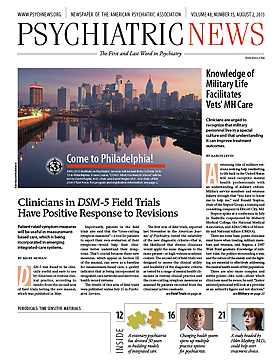Changes in the diagnostic criteria for schizophrenia in DSM-5 are modest, and continuity with DSM-IV is broadly maintained. Two changes have been made. One change is the elimination of the special attribution of bizarre delusions and Schneiderian first-rank auditory hallucinations (for example, two or more voices conversing). The second change is the addition of a requirement that at least one of the Criterion A symptoms must be delusions, hallucinations, or disorganized thinking. The DSM-IV subtypes of schizophrenia are eliminated due to their limited diagnostic stability, low reliability, and poor validity. These subtypes have not been shown to exhibit distinctive patterns of treatment response or longitudinal course and have doubtful validity. In DSM-5, schizoaffective disorder is reconceptualized as a longitudinal and not a cross-sectional diagnosis. Criterion A for delusional disorder no longer has the requirement that the delusions must be nonbizarre.
1. A 30-year-old single woman comes to medical attention. She had auditory and persecutory delusions for two months, followed by a full major depressive episode with sad mood, anhedonia, and suicidal ideation lasting three months. While the depressive episode resolved with pharmacotherapy and psychotherapy, the psychotic symptoms persisted for another month before resolving. What is the most likely diagnosis for this patient?
a) psychotic disorder NOSb) schizoaffective disorderc) major depressive disorderd) major depression with psychotic featurese) mixed depression and mania
2. Mr. C is a 27-year-old unmarried truck driver with a five-year history of active and residual symptoms of schizophrenia. He developed symptoms of major depression, which lasted four months (treated) including depressed mood and anhedonia, as well as an episode of mania that lasted six weeks, which resolved. What is the diagnosis that best fits Mr. C’s clinical presentation?
a) schizoaffective disorderb) psychosis NOSc) depression NOSd) schizophreniae) mixed anxiety and depression
3. Choose the symptom that would NOT be classified as a psychotic symptom for the purpose of diagnosing schizophrenia in DSM-5.
a) a patient is hearing a voice that tells him he is a good personb) a patient believes he is being followed by a secret police service that is only focused on himc) a patient has a flashback to a war experience that feels like it is happening againd) a patient can’t organize his thoughts and stops responding in the middle of an interviewe) a patient presents wearing an automobile tire around his waist and gives no explanation ■
